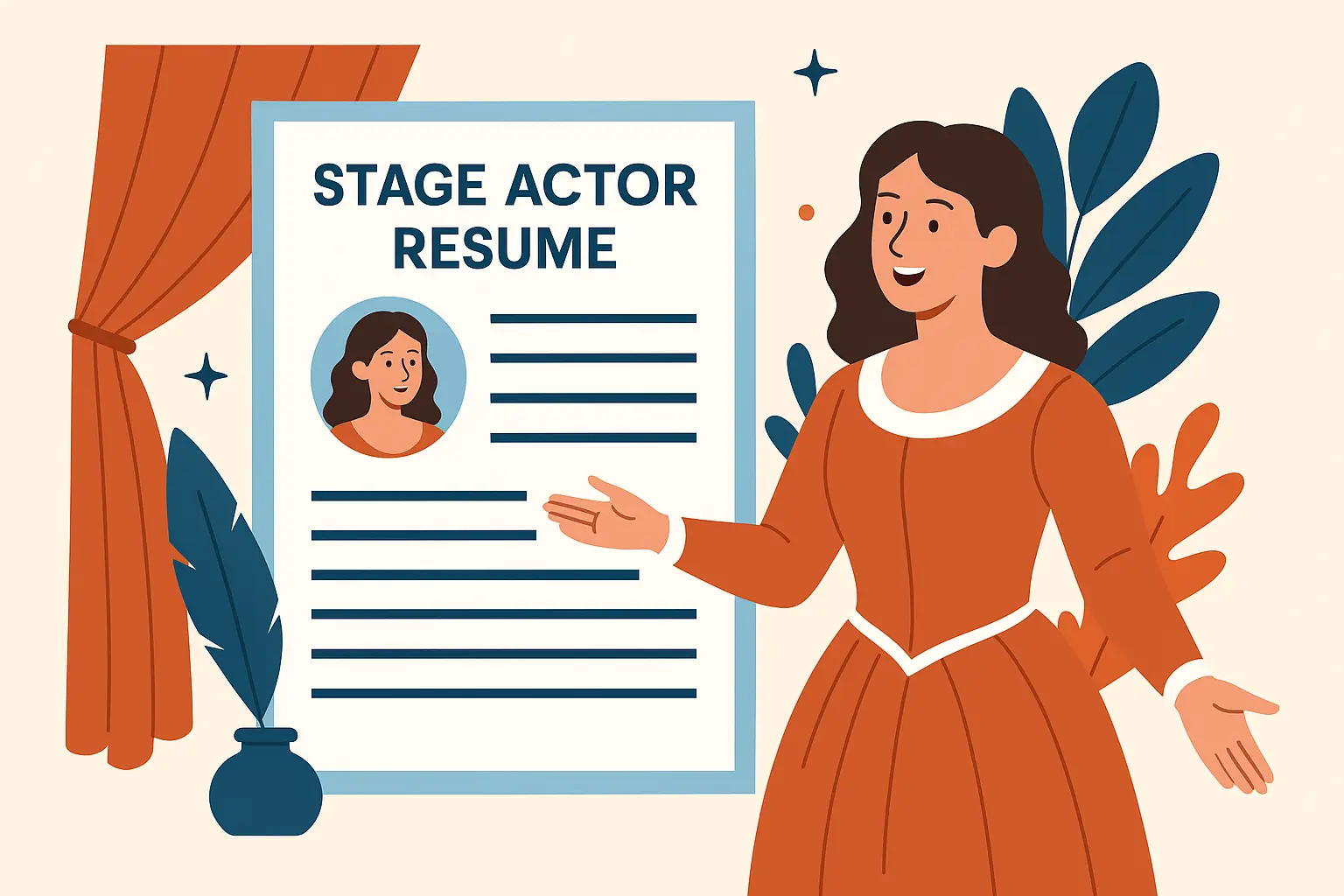A stage actor resume is more than a list of performances — it’s your professional calling card in the theatre world. Casting directors, producers, and audition panels often receive dozens of applications for a single role, and your resume needs to instantly show that you have the training, experience, and skills to stand out on stage.
Unlike a regular job resume, a stage actor resume focuses on your stage credits, theatre roles, training programs, and performance skills. Whether you’re pursuing classical theatre, Broadway, musicals, or drama-heavy productions, the right format and content can make the difference between landing an audition or being overlooked.
In this guide, we’ll cover four variations of stage actor resumes:
- Stage Actor Resume
- Supporting Stage Actor Resume
- Drama Stage Performer Resume
- Broadway Stage Actor Resume
We’ll also walk you through resume formatting tips, writing summaries and objectives, listing skills, education, certifications, and achievements — plus a full cover letter sample and answers to the most common FAQs.
For a broader perspective, you may also want to check our detailed guides on the Actor Resume and Theatre Resume, which cover additional styles and variations.
Stage Actor Resume Template
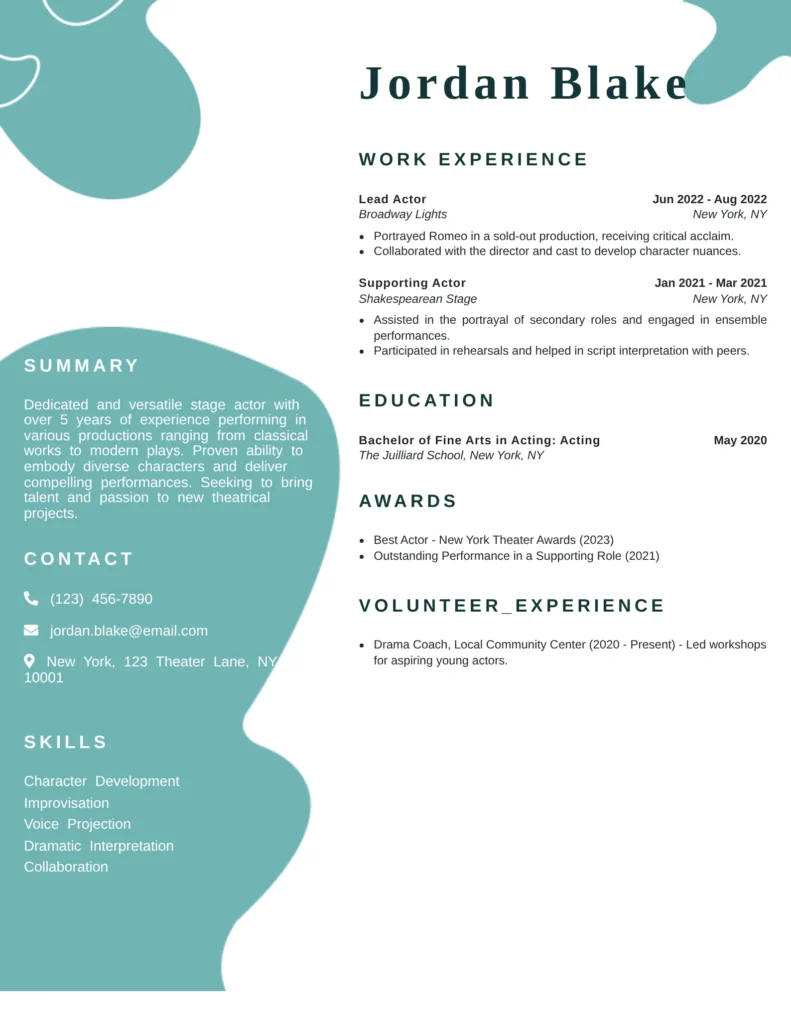
Why this Resume Is Good:
- Clear stage-focused experience: Work history highlights specific roles, productions, and achievements (e.g., portraying Romeo, critical acclaim), which is exactly what casting directors want to see.
- Strong summary statement: The opening summary communicates versatility, passion, and proven ability to embody characters — making the resume stand out right from the top.
- Balanced sections: Includes education (Juilliard), awards, and volunteer coaching — showing both professional credentials and community involvement.
- Relevant skills highlighted: Lists performance-centered skills like character development, voice projection, and dramatic interpretation, reinforcing the actor’s strengths.
Supporting Stage Actor Resume Template
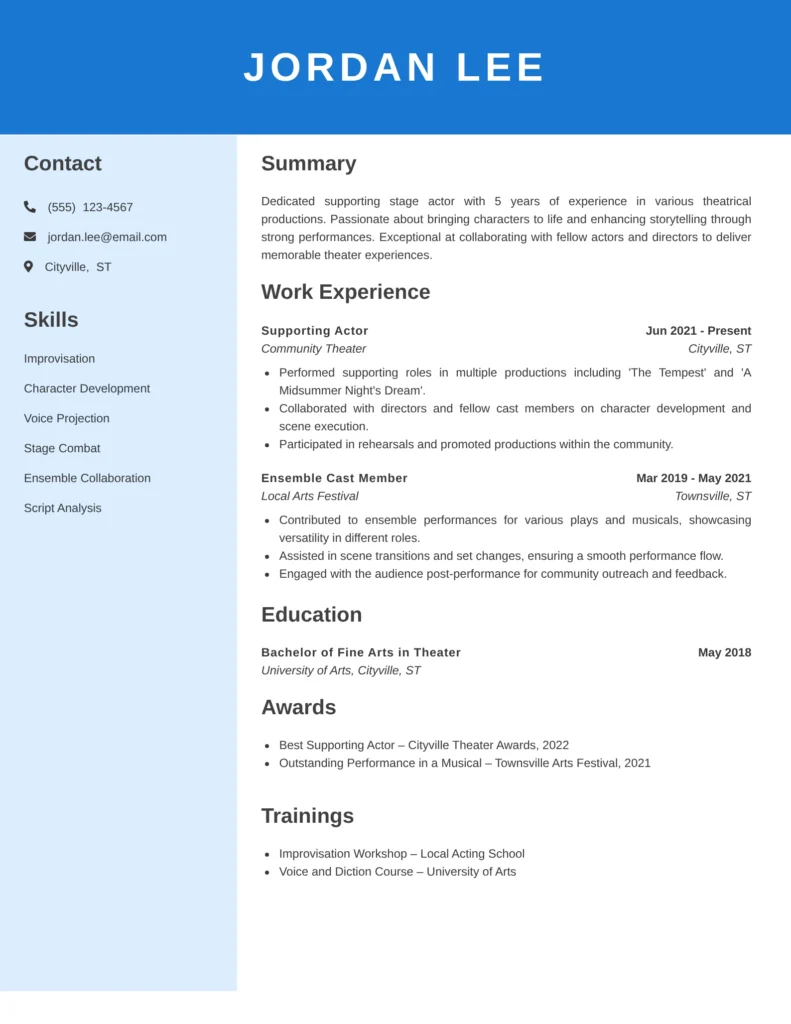
Why this Resume Is Good:
- Tailored for supporting roles: The summary directly emphasizes collaboration, storytelling, and ensemble work — exactly what casting directors expect from a supporting actor.
- Detailed work experience: Each role highlights specific productions (The Tempest, A Midsummer Night’s Dream) and clear contributions, not just job titles.
- Strong balance of sections: Education, awards, and specialized training are all included, showing both formal preparation and recognition.
- Skills aligned with role: Lists improvisation, ensemble collaboration, and script analysis — qualities that reinforce suitability for supporting performances.
Drama Stage Performer Resume Template
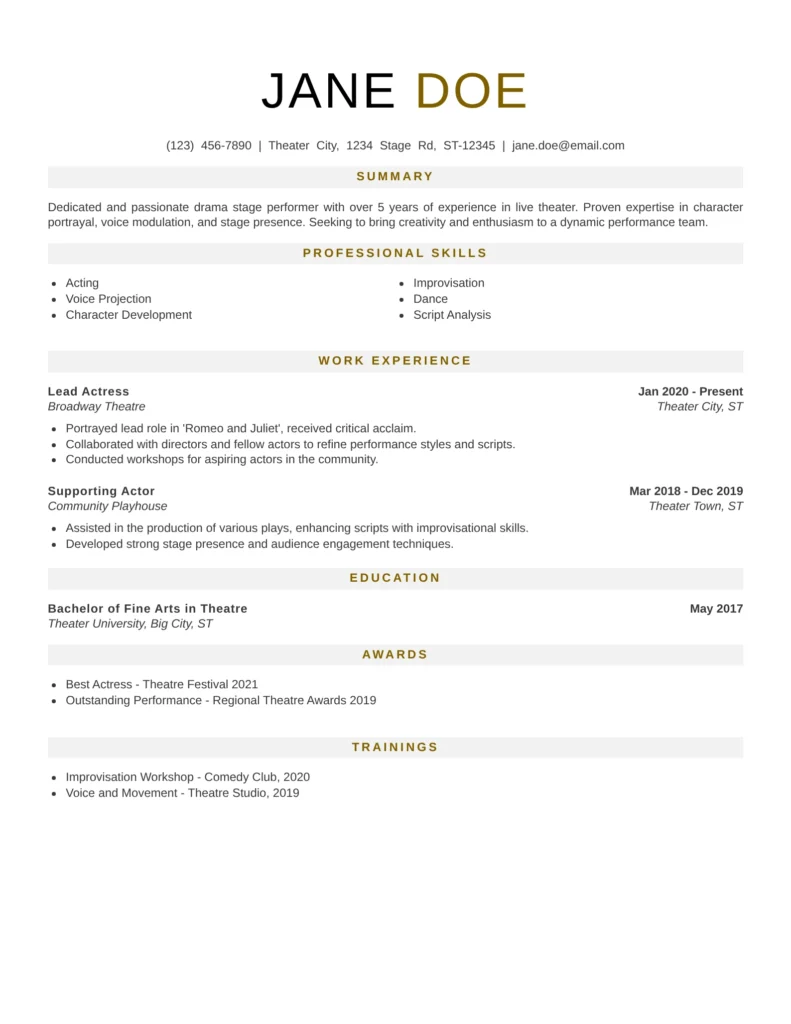
Why this Resume Is Good:
- Role-focused summary: The summary highlights drama-specific strengths like character portrayal, voice modulation, and stage presence — aligning perfectly with dramatic theatre demands.
- Balanced skills section: Lists both technical (acting, script analysis) and performance-oriented (improvisation, dance) skills, giving casting directors a quick snapshot of versatility.
- Experience tied to impact: Work experience doesn’t just list roles but emphasizes acclaim (Romeo and Juliet lead role), collaboration, and community contributions (workshops).
- Recognition & training included: Awards and specialized workshops (improvisation, voice and movement) reinforce both talent and continuous growth.
Broadway Stage Actor Resume Template
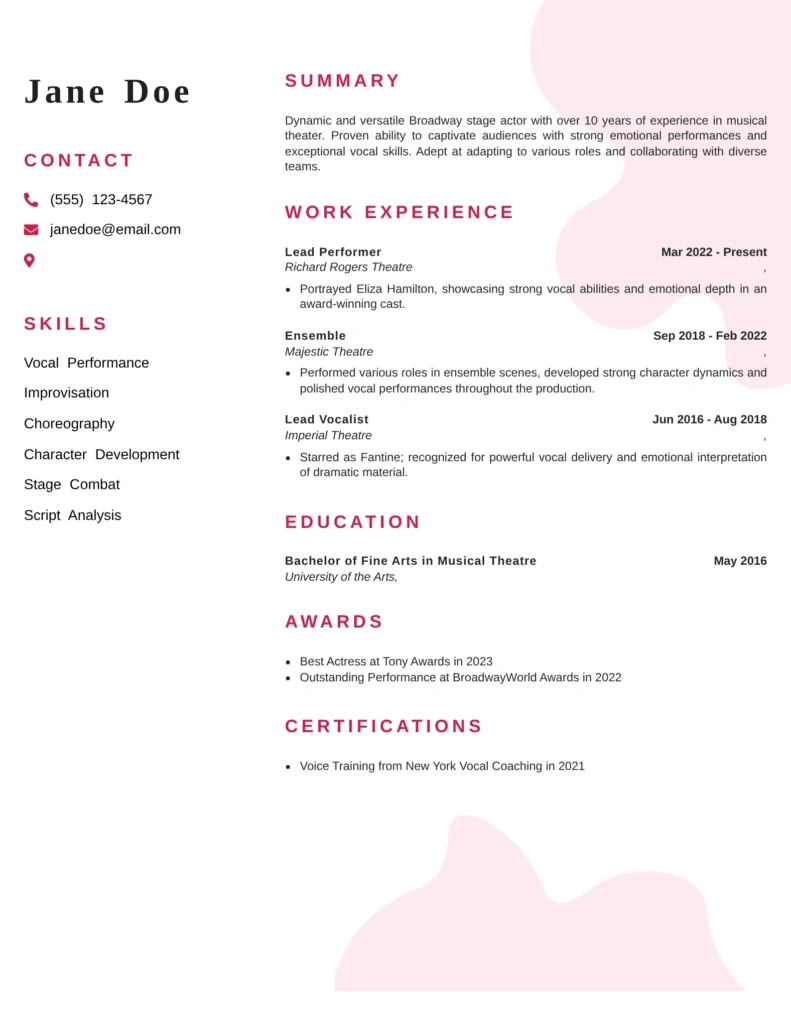
Why this Resume Is Good:
- High-impact summary: Opens by emphasizing Broadway-level experience (10+ years) and specific strengths like vocal performance, emotional depth, and adaptability — exactly what Broadway casting directors seek.
- Prestigious credits: Work experience highlights well-known productions (Hamilton, Les Misérables) with clear roles (lead, ensemble, vocalist), proving credibility at the highest level of theatre.
- Awards & recognition: Featuring major awards like the Tony Awards and BroadwayWorld Awards instantly elevates the resume’s authority.
- Specialized certifications: Includes vocal training, showing continuous improvement and commitment to maintaining performance standards on Broadway.
Choosing the Right Resume Template & Formatting
Before you start filling in your experience and credits, the structure of your resume matters. Casting directors prefer clean, professional layouts that make information easy to find. Here’s what to focus on:
Resume Format Options
- Word Templates: Easy to edit and customize. Useful if you frequently update your credits or want full control over layout.
- Google Docs Templates: Great for quick updates on the go and easy sharing. Ensures formatting consistency across devices.
- In Case you are transitioning to screen, you can checkout TV Actor Resume Template & Example.
Margins and Layout
- Keep margins between 0.5″ and 1″ for a balanced, readable resume.
- Use single spacing with a clear hierarchy (headings, roles, bullet points).
- Stick to a one-page format — long resumes are often ignored.
Best Resume Fonts for Stage Actors
- Safe professional resume fonts: Times New Roman, Arial, Calibri, Garamond.
- Avoid decorative or script fonts. Clean fonts ensure readability and give a professional look.
Why Use Professional Resume Templates
- Templates save time and keep formatting consistent.
- They help your resume look polished without graphic clutter.
- Many templates are ATS-friendly (important if applying to teaching, tutoring, or instructor roles in theatre schools).
If you want a broader collection, check our Resume Templates Word and Google Docs Resume Templates resources to start with a solid base.
Stage Actor Resume Example | Text Sample
Emily Johnson
1245 Broadway Ave, New York, NY 10001
(212) 555-7382 | emily.johnson.stage@gmail.com
Professional Summary
Versatile stage actor with 7+ years of experience performing in classical theatre, modern drama, and musical productions. Known for strong vocal projection, expressive body language, and the ability to embody diverse characters with emotional depth. Recognized for consistent professionalism, teamwork, and reliability both on stage and in rehearsals.
Key Skills
- Classical & Contemporary Acting Techniques
- Voice Projection & Diction
- Improvisation & Character Development
- Stage Combat (Certified)
- Singing & Dance (Jazz, Ballet, Tap)
- Collaboration with Directors & Ensemble Casts
Professional Experience
The New York Repertory Theatre – New York, NY
Stage Actor
2019 – Present
- Performed in over 30 productions including Shakespearean plays, musicals, and modern dramas.
- Lead roles in Romeo and Juliet (Juliet, 2022) and The Glass Menagerie (Laura, 2021).
- Collaborated closely with directors and choreographers to execute seamless performances.
- Received praise for vocal clarity and emotional intensity by NYC Theatre Review (2022).
Broadway Community Players – New York, NY
Supporting Actor
2016 – 2019
- Acted in ensemble roles across 12 productions.
- Assisted in stage setup and rehearsals, demonstrating adaptability and teamwork.
- Performed in touring productions across New Jersey and Pennsylvania, ensuring consistency in performance under varied conditions.
Education
Bachelor of Fine Arts (BFA) in Theatre Arts
New York University – Tisch School of the Arts, 2016
Training & Certifications
- Advanced Acting Workshop – Stella Adler Studio (2020)
- Stage Combat Certification – Society of American Fight Directors (2018)
- Voice Training – Linklater Technique (2017)
Awards & Recognition
- Best Actress, New York Community Theatre Awards (2022)
- Featured Performer, Broadway Rising Stars Showcase (2019)
References
Available upon request
Why This Resume Example Is Good:
- Clear demonstration of range: Shows ability in classical theatre, modern plays, and musicals.
- Proof of credibility: Lists respected institutions, certifications, and workshops that matter in stage acting.
- Tangible achievements: Highlights lead roles, touring work, and critical recognition that casting directors look for.
- Easy to scan: Well-structured with H3 headings, so directors and casting agents can quickly find relevant details.
Supporting Stage Actor Resume Example | Text Sample
Daniel Parker
879 East 45th Street, Brooklyn, NY 11203
(347) 555-1298 | daniel.parker.stage@gmail.com
Professional Summary
Dedicated supporting stage actor with 5+ years of experience in ensemble roles, understudy performances, and touring productions. Skilled at bringing depth and energy to secondary characters, supporting lead actors, and ensuring seamless transitions in live theatre. Known for strong collaboration, adaptability, and reliability during demanding production schedules.
Key Skills
- Ensemble & Supporting Roles
- Understudy & Quick Adaptation
- Improvisation & Character Support
- Stage Movement & Choreography
- Vocal Projection & Accents
- Professionalism & Reliability
Professional Experience
Lincoln Theatre Company – New York, NY
Supporting Actor
2020 – Present
- Played supporting roles in Hamlet (Horatio, 2023) and Les Misérables (Ensemble, 2022).
- Served as understudy for multiple lead roles, stepping in on short notice without disrupting the production.
- Collaborated with lead actors and directors to enhance storytelling through ensemble work.
- Received consistent recognition for professionalism and strong stage presence.
Midwest Touring Theatre – Chicago, IL
Ensemble Actor
2017 – 2020
- Participated in touring productions across six states, performing 100+ shows annually.
- Provided character support in ensemble-heavy productions such as A Midsummer Night’s Dream and West Side Story.
- Assisted in choreography and backstage coordination, ensuring smooth transitions during live performances.
Education
Bachelor of Arts (BA) in Theatre Performance
Columbia College Chicago, 2017
Training & Certifications
- Meisner Acting Technique Workshop – Chicago Acting Studio (2019)
- Voice & Diction Training – Linklater Technique (2018)
- Stage Combat Basics – SAFD Workshop (2017)
Awards & Recognition
- Ensemble Excellence Award, Chicago Theatre Guild (2019)
- Cast Member, National Touring Showcase (2018)
References
Available upon request
Why This Resume Example Is Good:
- Highlights supporting/ensemble strengths: Shows adaptability and value beyond leading roles.
- Proves dependability: Understudy experience demonstrates ability to step in under pressure.
- Balance of range & depth: Covers both touring and local stage work, making the resume versatile.
- Structured for casting directors: Clear H3 sections make credentials easy to navigate quickly.
Drama Stage Performer Resume Example | Text Sample
Sophia Martinez
312 West 89th Street, New York, NY 10024
(646) 555-4721 | sophia.martinez.drama@gmail.com
Professional Summary
Emotionally expressive drama stage performer with 8+ years of experience in classical and contemporary theatre. Adept at portraying complex characters, mastering dialogue-heavy scripts, and delivering high-impact performances that resonate with audiences. Recognized for powerful stage presence, versatility in dramatic roles, and dedication to character authenticity.
Key Skills
- Dramatic Acting (Classical & Modern)
- Character Analysis & Development
- Emotional Range & Expression
- Script Memorization & Delivery
- Voice Control & Projection
- Collaboration with Directors & Casts
Professional Experience
American Drama Theatre – New York, NY
Drama Performer
2018 – Present
- Lead roles in Death of a Salesman (Linda Loman, 2023) and A Doll’s House (Nora, 2021).
- Delivered emotionally charged monologues praised by The New York Times theatre critic.
- Worked closely with directors to refine pacing, gestures, and vocal intensity.
- Mentored junior actors on character-building and stage discipline.
East Coast Repertory Theatre – Boston, MA
Stage Actor
2015 – 2018
- Performed in award-winning production of Othello (Desdemona, 2017).
- Participated in dramatic festivals showcasing contemporary American playwrights.
- Developed strong improvisational ability for live audience engagement.
Education
Master of Fine Arts (MFA) in Acting
Boston University – College of Fine Arts, 2015
Training & Certifications
- Advanced Method Acting – Lee Strasberg Theatre Institute (2016)
- Voice & Speech Workshop – Kristin Linklater Program (2015)
- On-Camera Acting Workshop – Boston Film Academy (2014)
Awards & Recognition
- Best Actress in a Dramatic Role, American Theatre Awards (2022)
- Featured Performer, Boston International Drama Festival (2017)
References
Available upon request
Why This Resume Example Is Good:
- Focuses on drama-specific strengths: Highlights roles in emotionally heavy and dialogue-rich productions.
- Shows credibility: MFA degree plus prestigious acting institute training.
- Impact-driven achievements: Cites reviews, awards, and festival performances.
- Organized layout: H3 formatting ensures casting directors can scan quickly.
Broadway Stage Actor Resume Example | Text Sample
Michael Anderson
1450 7th Avenue, New York, NY 10019
(917) 555-8042 | michael.anderson.broadway@gmail.com
Professional Summary
Broadway stage actor with 10+ years of experience performing in award-winning musicals and plays. Skilled in singing, dancing, and dramatic acting, with a proven track record of delivering memorable performances on some of the most renowned Broadway stages. Recognized for exceptional work ethic, adaptability, and stage presence that connects with diverse audiences.
Key Skills
- Musical Theatre Performance
- Singing (Tenor Range) & Dance (Jazz, Tap, Ballet)
- Dramatic & Comedic Timing
- Improvisation & Characterization
- Collaboration with Directors & Choreographers
- Vocal Projection & Stage Presence
Professional Experience
Broadway Production: Hamilton – Richard Rodgers Theatre, NYC
Ensemble / Understudy for Aaron Burr
2020 – Present
- Performed 200+ shows annually as part of the ensemble cast.
- Stepped in as Aaron Burr for 15 performances, maintaining production quality and audience engagement.
- Worked with Tony Award-winning choreographers on complex stage sequences.
Broadway Production: The Phantom of the Opera – Majestic Theatre, NYC
Supporting Role (Raoul Understudy)
2016 – 2020
- Played ensemble roles while understudying for Raoul in over 50 performances.
- Honed vocal and acting skills through demanding rehearsal schedules.
- Collaborated with large cast and production crew to maintain Broadway performance standards.
Regional Theatre – Touring Company
Musical Theatre Actor
2012 – 2016
- Performed in touring versions of Les Misérables and West Side Story.
- Gained national recognition for strong vocal performance and adaptability.
Education
Bachelor of Fine Arts (BFA) in Musical Theatre
Carnegie Mellon University, 2012
Training & Certifications
- Broadway Dance Center Intensive (2018)
- Vocal Coaching – Seth Riggs Studio (2016)
- SAFD Stage Combat Certification (2015)
Awards & Recognition
- Ensemble Cast, Tony Award-Winning Production of Hamilton (2021)
- Theatre World Award – Outstanding Broadway Debut (2016)
References
Available upon request
Why This Resume Example Is Good:
- Tailored to Broadway: Highlights large-scale productions and ensemble/understudy roles unique to Broadway.
- Proves versatility: Covers singing, dancing, and acting—core skills for Broadway performers.
- Shows credibility: Includes Tony Award-winning productions and prestigious training.
- Easy to scan: H3 headings make the resume recruiter-friendly for casting calls.
How to Write a Stage Actor Resume
Resume Summary vs Objective
One of the first decisions is whether to start with a resume summary or a resume objective. Both appear at the top of your resume, but they serve different purposes.
- Resume Summary
- Best if you already have experience or stage credits.
- Summarizes your strongest achievements and skills in 2–3 sentences.
- Shows casting directors why you’re a good fit right away.
“Stage actor with 7+ years of experience in classical theatre and contemporary drama. Skilled in character development, vocal projection, and stage combat, with credits in regional and touring productions.” - Resume Objective
- Best for beginners or those transitioning from training into professional stage work.
- Focuses on your career goals and enthusiasm instead of credits.
- Shows motivation and potential even with limited experience.
“Aspiring stage actor eager to bring energy and creativity to live theatre productions. Trained in Shakespearean performance and vocal techniques, with recent experience in student and community theatre.”
Which One Should You Use?
- Use a summary if you have professional credits or strong training.
- Use an objective if you’re just starting out and want to highlight goals and training.
For more sample wording, explore our Resume Summary Examples guide.
Resume Summary Examples for Stage Actor Resume
Example 1 – Experienced Stage Actor
“Classically trained stage actor with 8+ years of experience in Shakespearean and contemporary theatre. Skilled in voice projection, dialects, and stage combat, with credits in regional and national productions. Recognized for versatility and strong collaboration with directors and ensemble casts.”
Example 2 – Musical Theatre Stage Performer
“Dynamic stage actor specializing in musical theatre with a wide vocal range (mezzo-soprano) and strong dance background in jazz and ballet. Performed in over 100 shows including touring productions, praised for high-energy performances and consistent professionalism.”
Example 3 – Drama-Focused Stage Actor
“Drama actor with a decade of experience in emotionally intense performances. Known for authenticity, script analysis, and ability to embody complex characters in both classical tragedies and modern dramas.”
Resume Objective Examples for Stage Actor Resume
Example 1 – Entry-Level Stage Actor
“Aspiring stage actor eager to bring creativity and energy to professional productions. Recent graduate of a BFA Acting program with strong training in improvisation, classical theatre, and vocal performance.”
Example 2 – Career Transitioning Stage Actor
“Motivated performer transitioning from student theatre to professional stage acting. Skilled in monologues, ensemble work, and character study, seeking opportunities to contribute to contemporary and classical productions.”
Example 3 – Community Theatre to Professional
“Passionate stage actor with recent community theatre experience in lead and ensemble roles. Excited to apply training in movement and voice to larger productions while continuing to grow through professional mentorship.”
Read More :- Film Production Manager Resume
Skills For Stage Actor Resume
A strong stage actor resume isn’t just about listing roles. Directors also want to see the skills that make you reliable, versatile, and ready for live performance. Break your skills into categories to make them easier to scan.
Technical / Performance Skills
- Voice projection and modulation
- Dialects and accents (British RP, Southern, French, etc.)
- Script analysis and character development
- Stage combat and movement training
- Improvisation techniques
- Musical theatre performance (singing, dancing, acting)
- Physical theatre and body awareness
- Monologue delivery and memorization
- Dance (ballet, jazz, tap, contemporary)
Soft Skills
- Collaboration with directors, cast, and crew
- Strong memorization and focus under pressure
- Adaptability to role changes or understudy duties
- Emotional intelligence for character depth
- Stage presence and confidence
- Professionalism and rehearsal discipline
- Creative problem solving in live performance
Personal Qualities
- Passion for storytelling and live theatre
- Resilience to handle demanding schedules and touring
- Discipline and commitment to craft
- Flexibility to work in diverse genres (drama, comedy, musicals)
- Openness to direction and constructive feedback
How to Present Work Experience on a Stage Actor Resume
For stage actors, the work experience section is all about credits — the roles you’ve played, productions you’ve worked in, and companies or directors you’ve collaborated with. Unlike a corporate resume, you don’t need to list unrelated jobs (unless they connect directly to theatre).
Best Practices
- List productions in reverse chronological order (most recent first).
- Include Role | Play Title | Theatre Company | Director’s Name (if notable).
- Add bullet points that show impact (awards, recognitions, number of performances, tours).
- Keep descriptions short and focused on achievements, not just duties.
- Stick to a one-page resume even if you have many credits — select the most relevant.
Also Read:- Artist Resume
Example – Experienced Stage Actor Work Experience
Lead Actor – Hamlet
New York Repertory Theatre | Directed by Sarah Collins | 2022 – 2023
- Performed lead role in 40+ live productions across two seasons.
- Recognized for vocal range and emotional depth in critical reviews.
- Collaborated with a cast of 20+ actors during national tour.
Supporting Actor – Les Misérables
Broadway Community Productions | 2019 – 2021
- Played multiple ensemble roles in 50+ performances.
- Supported lead actors with choreography and vocal harmonies.
- Maintained rehearsal discipline and stepped in for understudy performances.
Example – Entry-Level Stage Actor Work Experience
Actor – A Midsummer Night’s Dream
University Theatre Festival | 2022
- Played Lysander in student production with audiences of 500+.
- Practiced improvisation and comedic timing in classical text.
- Collaborated with director and ensemble to refine character work.
Performer – Community Theatre Showcase
Local Arts Centre | 2021
- Appeared in four short plays as part of a community ensemble.
- Developed stage presence and vocal projection through live shows.
- Assisted backstage with props and costume transitions.
How to Show Education on a Stage Actor Resume
Education matters in acting because it highlights your formal training, workshops, and performance programs. Unlike other jobs, casting directors don’t care about unrelated degrees — focus only on acting, theatre, and performance education.
Best Practices
- List highest relevant degree first (BFA, MFA, BA in Theatre/Acting).
- Include acting schools, conservatories, or workshops (Juilliard, RADA, Lee Strasberg Institute, etc.).
- If you don’t have a degree, list specialized training (voice, movement, improv, stage combat).
- Don’t overload with irrelevant education (like high school unless it was performance-focused).
Example – Education Entries
Bachelor of Fine Arts (BFA) in Acting
Juilliard School, New York, NY | Graduated 2020
Master of Fine Arts (MFA) in Theatre Performance
Yale School of Drama, New Haven, CT | Graduated 2017
Workshops & Training
- Advanced Shakespeare Performance – Royal Academy of Dramatic Art (RADA), 2022
- Vocal Training (Linklater Technique) – Kristin Linklater Voice Centre, 2021
- Stage Combat Certification – SAFD, 2020
Benefits Of Certifications & Achievements a Stage Actor Resume
Casting directors don’t just look at credits — they also notice the extra training and recognition you’ve earned. Adding certifications and achievements can set you apart in a competitive field. Here’s how they benefit you:
- Showcase Specialized Training
Certifications in stage combat, dialect coaching, or vocal performance prove you’ve gone beyond basic acting classes. This reassures directors that you can handle demanding or technical roles. - Increase Casting Confidence
A certified skill like fight choreography or voice modulation reduces risk for the production. Directors know they’re hiring someone already trained in safety and technique. - Highlight Commitment to Growth
Listing workshops, masterclasses, and continuing education shows dedication to improving your craft — something casting teams value highly. - Stand Out from Similar Resumes
Many actors may have similar credits. An award, festival recognition, or feature in a theatre review can make your resume more memorable. - Build Credibility for Teaching Roles
If you’re applying for theatre instructor or tutor positions, certifications double as proof of qualifications, making you more marketable.
Also Read :- Stunt Actor Resume
Best Certifications for Stage Actors
- SAFD Stage Combat Certification – Industry standard for safe fight scenes (swords, hand-to-hand, etc.).
- Linklater Voice Training – Boosts vocal projection, clarity, and emotional expression.
- Meisner Technique Certification – Highly respected for natural, authentic acting.
- Improvisation Training (e.g., Second City, UCB) – Proves adaptability and creativity on stage.
- Broadway Dance Center Programs – Dance training that strengthens chances in musicals.
- Dialect & Accent Training Certification – Shows versatility for diverse roles.
Bottom line: certifications and achievements add depth to your resume. They tell casting directors that you’re serious about your craft and recognized for your talent. Even a small award or one-day workshop can give you an edge in auditions.
Also Read :- Dance Resume
Resume Keywords for Stage Actor Resume
Keywords help your resume get noticed by both casting directors and applicant tracking systems (ATS). The trick is to weave them naturally into your summary, experience, and skills sections.
Using Keywords in a Resume – Examples
In Resume Summary:
“Stage actor with 5+ years of experience in classical theatre and ensemble acting, skilled in script analysis, vocal projection, and character development.”
In Work Experience:
- “Performed lead roles in 30+ stage productions including Shakespearean drama and modern theatre.”
- “Collaborated with directors and cast to maintain high rehearsal discipline during touring productions.”
In Skills Section:
- Stage combat, Improvisation, Monologue delivery, Musical theatre performance, Stage presence.
Use the Resume Keywords from the list given below naturally in your summary, skills, and experience sections.
Stage Actor Resume Keywords List:
- Stage performance
- Theatre production
- Ensemble acting
- Character development
- Script analysis
- Vocal projection
- Stage combat
- Improvisation
- Touring productions
- Classical theatre
- Dramatic performance
- Monologue delivery
- Musical theatre
- Stage presence
- Performance discipline
- Supporting stage actor
- Broadway stage actor
- Drama stage performer
- Stage actor responsibilities
- Stage actor job description
Examples of Action Verbs in a Stage Actor Resume
Performance & Execution
- Performed lead and supporting roles in over 40 stage productions.
- Portrayed classical characters including Hamlet and Othello in Shakespeare festivals.
- Delivered monologues and dramatic scenes with consistent vocal projection.
- Embodied diverse roles across comedy, tragedy, and experimental theatre.
Collaboration & Teamwork
- Collaborated with directors, choreographers, and cast to refine stage movement.
- Rehearsed intensively with ensembles to ensure synchronized performance.
- Supported lead actors by understudying roles and stepping in during live shows.
- Partnered with production teams to manage props, costumes, and backstage coordination.
Training & Instruction
- Coached junior actors in voice modulation and improvisation.
- Instructed community theatre students on stage presence and body language.
- Mentored new cast members to prepare them for professional auditions.
- Guided workshop participants in script analysis and dramatic interpretation.
Creativity & Adaptability
- Improvised during live shows to maintain performance flow under technical difficulties.
- Developed unique interpretations of characters in contemporary adaptations.
- Adapted to multiple roles within a single production, showcasing flexibility.
- Created original performance pieces for community theatre showcases.
Additional Read:- Actor Resume Examples
Cover Letter for Stage Actor Resume
A cover letter gives you a chance to show personality and passion beyond your resume. For stage actors, it’s not about re-listing every role, but about explaining why you’re the right fit for a production and what unique strengths you bring.
Tips for Writing a Stage Actor Cover Letter
- Address the letter directly to the casting director or theatre company.
- Mention the role or production you are applying for.
- Highlight one or two credits, skills, or training programs that matter most.
- Keep it short — one page, three to four paragraphs.
- End with a clear call to action, such as asking for an audition.
Additional Resources:- Cover Letter For Actor Resume
Sample Cover Letter – Stage Actor
Daniel Foster
112 West 47th Street
New York, NY 10036
daniel.foster@email.com | (917) 555-6371
April 20, 2025
Ms. Caroline Bennett
Casting Director
Broadway Repertory Company
New York, NY
Dear Ms. Bennett,
I am excited to apply for the role of Tom Wingfield in your upcoming production of The Glass Menagerie. As a classically trained stage actor with over six years of experience in both classical and contemporary theatre, I believe I can bring depth and authenticity to this role.
In my most recent performance at the Hudson Valley Shakespeare Festival, I portrayed Hamlet across 30 shows and received strong reviews for both emotional delivery and vocal presence. I also bring specialized training in stage combat and voice modulation, which ensures versatility in demanding productions.
What excites me most about your company is the focus on blending classic American drama with modern staging. I would welcome the chance to audition and contribute to your production while upholding the professionalism and creativity your theatre is known for.
Thank you for considering my application. I look forward to the opportunity to audition and share my craft with your team.
Sincerely,
Daniel Foster
Conclusion
A stage actor resume is more than a list of roles — it’s a snapshot of your journey as a performer. Casting directors and producers don’t just want to know what plays you’ve done; they want to see the training, skills, and dedication that make you reliable on stage.
Throughout this guide, we explored different types of resumes — from supporting stage actor to Broadway performer — along with tips on formatting, summaries vs. objectives, skills, experience, and cover letters. If your performance background also includes choreography or dance-heavy theatre productions, you can check out our detailed guide on the Musical Theatre Dancer Resume to see how to highlight movement and stage synchronization effectively.
Keep your resume focused, professional, and updated after every production. Use strong keywords and action verbs to give your achievements weight. Highlight the details that make you stand out — whether that’s stage combat certification, versatility across genres, or awards that prove your craft.
In the end, your resume is your first audition. Make it clean, make it powerful, and make it unmistakably yours.
Also Read :- Child Actor Resume
FAQs(People Also Asked)
A stage actor resume should include your name and contact details, a short summary or objective, stage credits (role, play, theatre, director), training and education, skills, and any certifications or awards. Keep it one page and focused only on acting-related information.
No, a degree isn’t required to work as a stage actor. Many professionals build their careers through community theatre, workshops, and auditions. However, formal training programs (BFA, MFA, conservatories) can strengthen your craft and help with networking.
List each production in reverse chronological order. Include:
Role | Play Title | Theatre Company | Director’s Name (optional).
Example: Lead Actor – Hamlet | New York Repertory Theatre | Directed by Sarah Collins | 2023. Add 2–3 bullet points for notable achievements.
Yes. Skills like stage combat, dialects, musical theatre, or dance styles can set you apart from other actors. Soft skills such as collaboration, adaptability, and memorization also matter because they show reliability in live performance.
One page. Casting directors review dozens of resumes at once and won’t read long documents. Focus on your best and most recent credits, training, and skills.
A stage actor resume can include a variety of live performance roles, from musicals to classical plays. A drama performer resume focuses specifically on emotionally intense, dramatic performances in plays or theatre festivals.
Yes. Many actors begin with student productions, workshops, or community theatre. If you don’t have credits yet, use an objective statement to show passion and goals, and highlight training, workshops, and any performances you’ve done.

